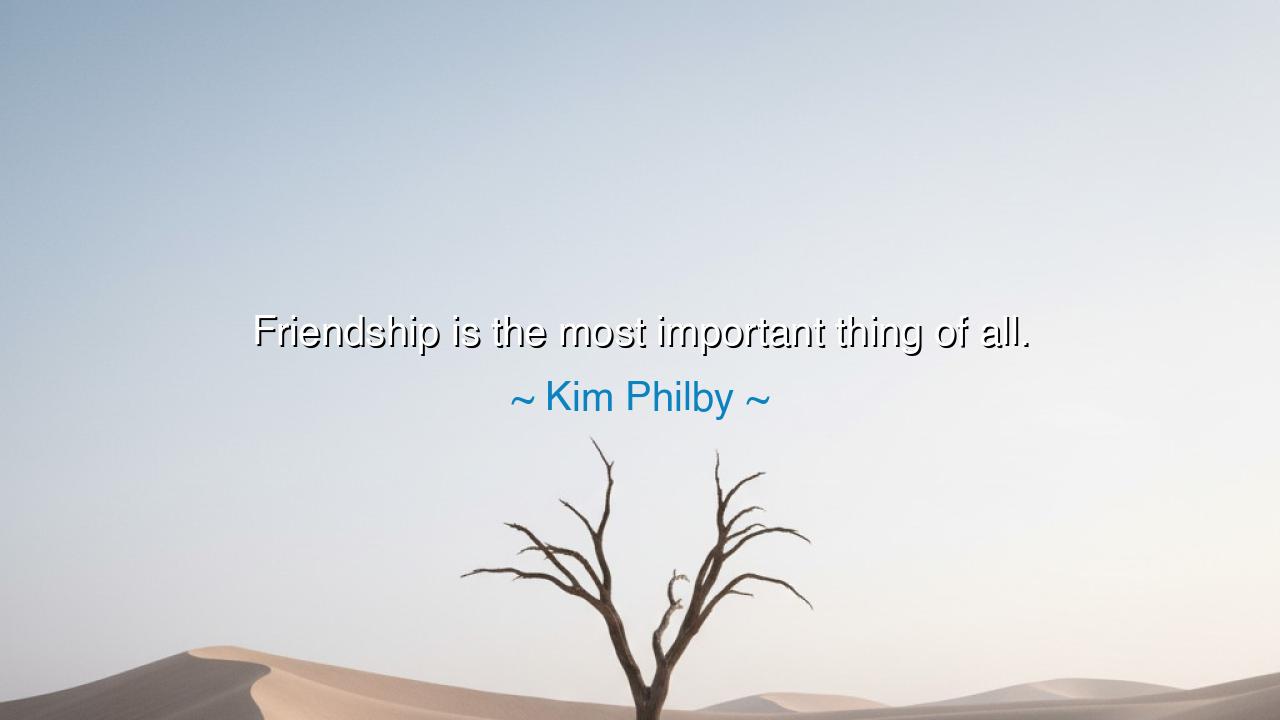
Friendship is the most important thing of all.






"Friendship is the most important thing of all." These words, spoken by Kim Philby, carry with them a profound weight, echoing the timeless truth that friendship is not just a mere social connection but the very foundation upon which the human experience is built. In a world that often places wealth, status, and power above all else, Philby reminds us of the sacredness of friendship—the bond that transcends all others and provides meaning and depth to our lives. Friendship is not a fleeting acquaintance or a transactional exchange; it is a sacred bond that sustains us, challenges us, and offers us solace in times of trouble.
In the ancient world, friendship was often regarded as the highest form of human relationship, far surpassing even the strongest of romantic or familial ties. Aristotle, in his Nicomachean Ethics, declared that friendship was one of the most important pillars of a good and virtuous life. He believed that the most profound friendships were those built on shared values and virtue, where each person not only sought the happiness of the other but also helped guide one another toward a greater understanding of goodness and truth. These friendships were not based on self-interest but on a shared commitment to each other’s well-being. Philby’s words echo this ancient wisdom: friendship is not something to be taken lightly or relegated to second place—it is the foundation of all meaningful connections and the highest aspiration of the human soul.
Consider the story of David and Jonathan in the Bible, whose friendship stands as one of the most enduring examples of the sacredness of friendship. Jonathan, the son of King Saul, could have chosen loyalty to his father, but he saw in David a kindred spirit—a man of virtue and honor. Their friendship was not born out of convenience, nor did it serve a selfish purpose. Jonathan risked everything, including his own future and inheritance, for the sake of David’s well-being. The bond between these two men transcended the political struggles of the time, and even when Jonathan’s father sought David’s life, his loyalty to David remained unwavering. In their friendship, we see the ideal of friendship as Philby speaks of—one that is unshakeable, selfless, and above all, the most important thing of all.
In the life of Socrates, we also find a profound expression of friendship. Socrates was not a man of wealth or power, but his influence came through the friendships he formed with those who shared his pursuit of wisdom and truth. The relationship between Socrates and Plato, for example, was not one of mere teacher and student but of deep friendship and mutual respect. Plato revered Socrates not only for his intellectual genius but for his virtue and his unwavering commitment to living an examined life. In turn, Socrates saw in Plato a companion on the journey toward greater understanding, and it was through their friendship that Plato was shaped into the philosopher he became. Their friendship was the foundation upon which both built their intellectual legacies, and through it, we see that true friendship is not only about companionship but also about the mutual growth and moral development of both individuals.
The wisdom of Philby also brings to mind the concept of friendship in the face of adversity. Friendships are often tested not in times of ease and comfort, but in moments of trial and difficulty. The bond between Achilles and Patroclus, as told in Homer's Iliad, offers another powerful example of the enduring nature of friendship. Though their relationship was marked by the brutality of war, the friendship between these two warriors transcended the violence around them. When Patroclus was killed in battle, Achilles’ grief was not just for the loss of a comrade but for the loss of a friend whose presence had shaped his very identity. The deep bond they shared was one of loyalty and sacrifice, and through Patroclus’ death, Achilles was reminded of the profound importance of their friendship—a relationship that endured beyond even death.
The lesson from Philby’s words is clear and universal: friendship is not merely a pleasant addition to life, but the very bedrock upon which we build our strongest and most lasting connections. It is through friendship that we find our greatest strength, our most profound meaning, and our truest sense of belonging. In a world often focused on personal gain and self-interest, friendship offers something far more enduring—an unwavering bond that supports us, challenges us, and helps us grow in ways that nothing else can.
In our own lives, we must strive to nurture the friendships that bring us closer to our true selves. Friendship requires not only trust and loyalty, but the willingness to invest time and care in those who truly matter. Let us value our friends, not as mere companions but as partners in the journey of life, knowing that the friendships we build today will be the foundation of our greatest achievements and our most meaningful moments. In this way, we honor Philby’s wisdom, recognizing that friendship is the most important thing of all, and in cultivating it, we create lives that are rich, full, and deeply fulfilling.






AAdministratorAdministrator
Welcome, honored guests. Please leave a comment, we will respond soon